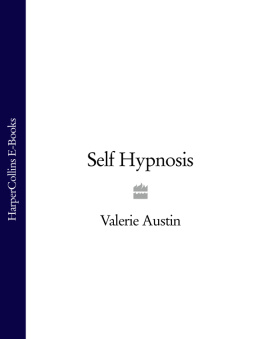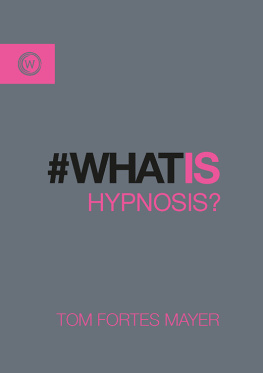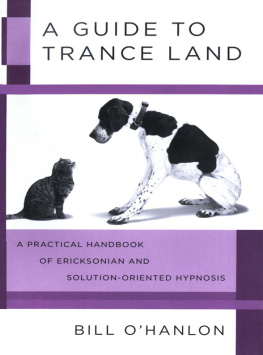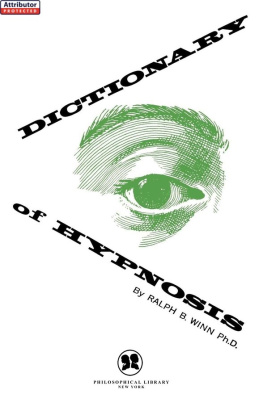Michael D. Yapko - Process-Oriented Hypnosis
Here you can read online Michael D. Yapko - Process-Oriented Hypnosis full text of the book (entire story) in english for free. Download pdf and epub, get meaning, cover and reviews about this ebook. year: 2021, publisher: W. W. Norton & Company, genre: Religion. Description of the work, (preface) as well as reviews are available. Best literature library LitArk.com created for fans of good reading and offers a wide selection of genres:
Romance novel
Science fiction
Adventure
Detective
Science
History
Home and family
Prose
Art
Politics
Computer
Non-fiction
Religion
Business
Children
Humor
Choose a favorite category and find really read worthwhile books. Enjoy immersion in the world of imagination, feel the emotions of the characters or learn something new for yourself, make an fascinating discovery.
- Book:Process-Oriented Hypnosis
- Author:
- Publisher:W. W. Norton & Company
- Genre:
- Year:2021
- Rating:3 / 5
- Favourites:Add to favourites
- Your mark:
- 60
- 1
- 2
- 3
- 4
- 5
Process-Oriented Hypnosis: summary, description and annotation
We offer to read an annotation, description, summary or preface (depends on what the author of the book "Process-Oriented Hypnosis" wrote himself). If you haven't found the necessary information about the book — write in the comments, we will try to find it.
Process-Oriented Hypnosis — read online for free the complete book (whole text) full work
Below is the text of the book, divided by pages. System saving the place of the last page read, allows you to conveniently read the book "Process-Oriented Hypnosis" online for free, without having to search again every time where you left off. Put a bookmark, and you can go to the page where you finished reading at any time.
Font size:
Interval:
Bookmark:

Advance Acclaim
How do you acquire a lifetime of learning, research, and experience in the most effective art and practice of clinical hypnosis without spending a whole lifetime doing so? In Process-Oriented Hypnosis, Michael Yapko distills and shares the very essence of his career-long knowledge and wisdom as a world-leading practitioner, teacher, and writer. His unique contribution with this new volume is in ways to use hypnosis effectively by articulating the specifics of how to be nonspecific. The process for learning this and becoming a more masterful clinician yourself is simple: first, read the book, and second, apply its approaches.
George W. Burns , Adjunct Professor of Psychology, author, 101 Stories for Enhancing Happiness and Well-being
Michael Yapko has explored an element that has become identified as a core Ericksonian approachthe tailoring that follows listening carefully to the words, the phrases, and the expressions of the client, then subsequently adapting the direction of therapy specifically to the needs, wants, and desires of what is revealed and expressed by the subject. Yapko has taken that basic concept and turned the whole picture upside down and inside out. And in so doing, he may have arrived at the most Ericksonian of all approachesthat of looking at the forest and working within the context of the bigger picture.
Roxanna Erickson Klein, Ph.D. , coauthor, Hope and Resiliency: Understanding the Psychotherapeutic Strategies of Milton H. Erickson, MD
Process-Oriented Hypnosis offers a fresh and approachable vocabulary for many of the process-oriented concepts and techniques that have often been overlooked and all but lost in the teaching and training of modern psychotherapy. Process-Oriented Hypnosis reanimates then creatively expands upon these multi-dimensional approaches with the kind of clear emphasis on practicality that is typical of Yapkos writings. This book is long overdue and is a must-read for all therapists, whether they use hypnosis as a context for treatment or not.
Stephen R. Lankton , LCSW, DAHB, FASCH, Editor-in-Chief, American Journal of Clinical Hypnosis
Once again Michael Yapko is proving himself to be a leader in the field of therapeutic hypnosis in Process-Oriented Hypnosis: Focusing on the Forest, Not the Trees . This how-to book integrates practicing psychotherapy with salient and positive principles including ambiguity, expectancy, discrimination, impulses, compartmentalizing, acceptance, responsibility, action, integrity, and foresightthe major principles of modern therapeutic hypnosis. These are, indeed, the trees that make up the forest of effective treatments. Bravo, Michael!
Ernest L. Rossi, Ph.D. and Kathryn L. Rossi, Ph.D. , codirectors, PsychoSocial Genomics Research Institute and The Milton H. Erickson Institute of California Central Coast

A Norton Professional Book
Process-Oriented Hypnosis
Focusing on the Forest, Not the Trees
Michael D. Yapko

To Diane with love
44 years later, your smile is still
my very favorite thing to see
Contents
In 1984, I was honored to write the foreword to the first edition of Michael Yapkos book Trancework: An Introduction to the Practice of Clinical Hypnosis , which has continued to be the definitive textbook for the practice of clinical hypnosis and is now in its fifth edition. In that foreword, I noted that he provided the necessary building blocks to learn and understand the evocative vocabulary and grammar of hypnotherapy. Now, more than 35 years later, I am honored to write a foreword to Process - Oriented Hypnosis , which builds on the exemplary contributions this talented therapist and theorist has made in the decades subsequent to Trancework .
As one of the worlds leading experts in the practice of hypnosis, in this book, Michael extols the value of hypnosis in psychotherapy. Even more, he provides a template for improving psychotherapy, regardless of ones preferred theory and form of practice. Hypnotic processes are inherently woven into every form of psychotherapy, whether or not the practitioner realizes it, and the intentional use of hypnotherapy, even without formal induction, can be immensely beneficial.
We become clinicians because we want to help clients live more adaptively. But there is no right way to provide therapy. As Michael explains, there are many entry points for effective psychotherapy and just as many departure points, because finite patterns and concomitant behaviors underlie human suffering. While pathology has common roots no matter what the presenting problem, the good news is, there are no limits when it comes to human adaptation.
In this edition, Michael outlines general themes that underlie most client problems, including intolerance of ambiguity, lack of control over impulses, and relinquishing personal responsibility. Careful study of these themes and Michaels innovative approach to overcoming them will help clinicians be more effective, regardless of the specifics of the presenting problem.
When it comes to what makes psychotherapy work, Michael and I share many beliefs and orientations, including an emphasis on the utilization of the clients adaptive processes, instead of analyzing client weaknesses. We both maintain that evocative experiences trump psychodynamic understandings, and that the power of communicationas especially evidenced through hypnotic processesis remarkable. We see trance as a way of awakening people to dormant resources, and not as a method of programming a person to do this or that. Neither Michael nor I are keen on using hypnotic scripts. We believe that therapy is an art, the same way that adaptive living is an art, and should therefore involve creativity, spontaneity, and tailoring to individual needs. And because living happens in the present and is directed to the future, we should be goal oriented in clinical practice.
Michael Yapko is as much an advocate for hypnosis today as he was nearly four decades ago. And his dedication to his art is apparent in both his work as a therapist and his contributions as an author. Join him on his continuing journey in making powerful hypnotic processes part of therapeutic practice. This book will help you become a more effective and creative clinician. It is user friendly, easy to read, and replete with practical suggestions for bettering clinical practice.
Jeffrey K. Zeig
Phoenix, May 2020
erickson-foundation.org
It is not the strongest of the species that survives, nor the most intelligent that survives. It is the one that is most adaptable to change.
Charles Darwin
When I decided to actively pursue a career in psychology as a young college student, my academic coursework and clinical training required my participation in different forms of the therapy experience. The thinking at the time by those in charge was that through your own therapy experiences, group and individual, you could reduce the risk of your personal issues contaminating your work and also better understand what your clients would experience by being in therapy.
I knew about my own issues well before those experiences, though. I knew I was way too perfectionistic, intolerant of mistakes I made, and often pretty harsh in what I would say to myself. As my involvement in the therapy field gradually deepened, I became increasingly concerned that perhaps I wasnt meant to be a therapist when my own issues were so unyielding. Filled with self-doubts and negative judgments about myself, more than once I thought Id better choose a different profession. How lucky for me that I didnt because of a single interaction!
Font size:
Interval:
Bookmark:
Similar books «Process-Oriented Hypnosis»
Look at similar books to Process-Oriented Hypnosis. We have selected literature similar in name and meaning in the hope of providing readers with more options to find new, interesting, not yet read works.
Discussion, reviews of the book Process-Oriented Hypnosis and just readers' own opinions. Leave your comments, write what you think about the work, its meaning or the main characters. Specify what exactly you liked and what you didn't like, and why you think so.









